In order to have joined the Allied Masonic Degrees of Canada it is generally understood that each Brother of Saint Lawrence has been through at least seven degree ceremonies within the Masonic world. Most Brothers have been through more than that. It would be obvious to the Brothers, that not all degrees, not all ceremonies, are equal.
A rose by any other name may not be the same: A critical examination of degree conferral and transmission.
Ven. Bro. Scott Wisdahl Peace Council No. 224 11 Jun 20
Some of the ceremonies may not have been as meaningful because of the quality of the presentation, the preparation of those giving the degree, and the setting.
Perhaps the Brother was mentally distracted by something in their mundane world, rushed from work or family, or simply not feeling well.
This, however, may not be the only reason for the differences. One way to examine a degree might be how powerful it is, and how original.
Some degrees are done with a mass of candidates, generally using a single representative. Some degrees are essentially just a series of lectures. Other rituals have profound impacts on the individual partaking in it.

IMAGE: the square magazine digital collection
To differentiate the two types of degree rituals the terms ‘conferred’ and ‘transmitted’ will be used.
A degree that is conferred is one that, while potentially beautiful and important, doesn’t have the same impact on the candidates psyche and is not one that is done, one-on-one.
A ritual that is transmitted is one generally that is designed to have a lasting and profound effect on its candidate.
This division is not meant to imply anything regarding quality or value. A degree that is conferred with beauty and ability is of value.
The lessons of that ritual are important. They provide the basic knowledge base for the candidate in that degree and it ties them to the other members who have also had this degree conferred.
Transmission of a degree also implies a passage of information and knowledge and a binding to the group.
It is, however, a more personal experience that binds the initiator to the initiate. The ritual, itself, must have a psychological, an emotional, impact.
Essentially the ritual is a ‘rite of passage’. Once completed, the individual is not the same again [1].
Why then, have this division of degree rituals? Perhaps it can be argued that the difference is important in that the restrictions imposed on performing a degree may not be appropriate in some cases.
The restrictions that are meant are specifically the requirements for tyling and for performing the ritual in person.

IMAGE: the square magazine digital collection
It can be argued that essentially all of the degree ritual materials are able to be found on internet.
Even the Craft’s view that the ‘Secrets’ of the degree are simply the ability to recognize a true Brother. These recognition means, are also available on the internet.
If the rituals are essentially available to everyone, and anyone can determine how to recognize another member of that degree, why then is there restrictions placed on how rituals are conducted [2] ?
One reason to place restrictions on how ritual is conducted is to provide the opportunity to put the materials in context and hopefully entertain as well as educate the candidates.
As an analogy, reading Shakespeare work is not the same as attending a live performance of the same work.
A second reason, perhaps, for the tyling for degrees is so that those involved are not identified, not exposed to people who are not members.
Closely aligned with this, is to prevent a ritual from being disturbed by uninvited people or lampooned. In the ‘Zoom’ world, this is like using the security features to prevent outsiders from ‘Zoom bombing’ or rebroadcasting a private meeting.

IMAGE: the square magazine digital collection
A third reason for performing rituals in the traditional tyled Lodge is that it is an opportunity for fellowship and for advancement.
The candidates interact with the other members; the other members get to see the ritual and its impact on the candidate; and members have the opportunity to learn a ‘part’ and deliver it.
Those that enjoy ritual, whether watching or performing, will understand this reason.
A final reason for a closely tyled chamber, and one that is prepared correctly is when the ritual involved a transmission.
The candidate (almost always individual) needs to be placed in a situation of deep anticipation and perhaps even anxiety.
They are then led through the ritual and when performed correctly, they cross through a portal, or veil, to connect with the initiator and their new work.

IMAGE: the square magazine digital collection
For Brothers of St Lawrence, their initial three Masonic degrees would be a case of transmission. Before Initiation they were just a man.
After the ceremony they were a Brother, and this will never change. The third degree is an example of a profound emotional response and it is why the actual raising is done individually.
No Mason would dispute the impact of the raising.
For these same Brothers, the degree of St Lawrence the Martyr can be juxtapositioned. While the degree has some beautiful sentiments on hospitality as well faith to one’s beliefs, it is not likely to have left a deep emotional impact or psychological event.
This degree would be said to have been conferred. This doesn’t make the St Lawrence degree of no or little value, it is just that it could be conferred in different ways.
Conceptually the idea is not that a conferred degree should be done in public, with open admission.
However, it is probably that most of the conferred degrees could be presented using digital means. Some degrees are essentially a series of lectures. Others involve some visual references.
The concept of floor work, that is moving in a specific patter and physically standing in a specific way is not likely to work using video conferencing. However, things like tracing boards and other images could be presented better on screen.
One might miss the ‘long march’ of the Most Excellent Master’s degree, and its inherent exercise routine, but little of the message would be lost if a video was presented showing the final part of that degree and placement of objects was shown. Even a series of well crafted still images would suffice.

IMAGE: the square magazine digital collection
If conferred degrees could be presented in other methods, for example Zoom or equivalent, there is the opportunity to have more people in attendance from other locations.
Having more of a fixation on delivering the degree, versus running a meeting, could work to improve its delivery.
Different people in attendance would allow for more discussion and education of the degree. Where weather (or pandemic) conditions prevent physically coming together, this allows for degree/ritual work to continue.
Separating the conferrals from transmissions, also allows for a tighter focus on the ritual when it will be presented. Transmission would remain in person and in the hands of the Initiator.
The Allied Masonic Degrees give a great example of conferral of degrees. Rituals that had been written can be presented without having to trace a direct line (or lineage) from Initiator to Initiator.
This provides opportunities for Masons to continue to develop and become better men and understand more of their world and their Craft. Perhaps the other Bodies should examine how they too could confer degrees.
Footnotes
References
[1] Much of this material can be found in a paper by Christopher Lirette “Betwixt and Between, the Role of Ritual in Esoteric Societies”.
[2] This is notwithstanding the fact that members of a degree will always take an oath never to participate in the delivery of that degree except in a formed ‘Unit’. For the purposes of this paper, this concept will be omitted.
Article by: Scott Wisdahl
RWBro. Scott Wisdahl
Junior Warden, Fort St. John Masonic Lodge No. 131. Grand Lodge of BC & Yukon
Recent Articles: membership
 A Rose by any other Name may not be the same Explore the profound distinctions between conferred and transmitted Masonic degrees with Bro. Scott Wisdahl. Delve into how presentation quality, personal impact, and setting shape these rituals, and consider the potential for digital adaptations in modern Masonic practices. Join the discussion on enhancing the Masonic journey and preserving its essence. |
 Progression through the Degrees; a Rite or a Privilege? Exploring the layered journey of Freemasonry, Matt DA Fletcher probes the essence of progression—whether it's a mere rite or a privileged path. Delve into a nuanced perspective where every degree is not just a milestone but a fraction of a grander continuum. |
 Quantity vs Quality within the world of Freemasonry Dive into the compelling debate of quantity vs quality within the world of Freemasonry. Discover the transformative focus on attracting members aligned with the institution's values, promising not only growth but quality growth. High-value individuals assure sustainable development with their commitment to serving the brotherhood. |
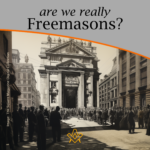 Maybe Freemasonry has opened its doors too wide. Perhaps some have not understood that the survival of Freemasonry in order to achieve its sublime purpose lies not in the number of members it has, but in their quality. Maybe we need less members and more Freemasons. Less men in Freemasonry and more Freemasonry in men. |
 What is ritual and why is it important? P1 Delve into the profound world of Freemasonry rituals and their significance. This insightful piece unravels the underlying importance of rituals, their impact on participants, and the transformative power they hold. Uncover why these centuries-old traditions remain integral to Masonic practice today. |
 Could Freemasonry be helpful for young men? Unravel the Masonic Brotherhood: Could Freemasonry be the antidote to modernity's challenges for young men? Dive in as we explore the Masonic world, its principles, camaraderie, and how its traditional rituals could help forge stronger identities in an increasingly complex world. |
 Discover the remarkable benefits of Lodge Meetings on your well-being. From fostering connections to combating stress, learn how these male-oriented gatherings offer an antidote to anger, hunger, isolation, and exhaustion. Dive into the power of shared experiences, understanding, and camaraderie. Your key to improved mental health awaits inside. |
 Tutorial for a Worshipful Master Unlock the Secrets to Leadership Mastery in our Worshipful Master's Tutorial! Brother Antonio Biella shares step-by-step guidance for Masonic Lodge leaders on honing their roles, duties, and future vision. Discover how to drive growth and engagement in your Lodge, setting ambitious goals and inspiring member participation. |
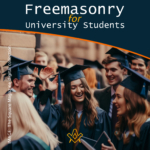 Freemasonry for University Students What are social skillset challenges facing students when they graduate from university ? |
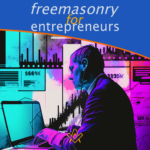 How the Core Values of Freemasonry; Brotherly Love, Relief and Truth Can Be Applied to Improve Productivity For Entrepreneurs |
 Why I became a Freemason: a personal journey of self-improvement Salik Tariq shares his reasons for becoming a Freemason – a journey of self-improvement, finding a community, and personal growth. |
 Freemasonry: Coming out of the Cloisters This paper examines the fundamental tensions on the lines of religion, gender and political ideology that exist in some jurisdictions of Freemasonry. It is on the first of these, religion, on which he makes an initial and exploratory focus. - by Gerald Reilly |
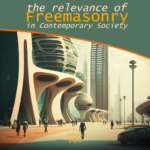 The Relevance of Freemasonry in Contemporary Society The role of Freemasonry in contemporary society is an indispensable one. Despite the challenges and misconceptions it faces, the organization remains steadfast in its humanitarian pursuits and commitment to personal growth and self-betterment. Through its efforts to evolve and adapt to the changing needs of its members and the world, Freemasonry continues to be a vital force in shaping a better future for all. |
 Has Freemasonry managed to revive and thrive after the darkness of the Pandemic? Robert Lomas gives us some (promising) insights. |
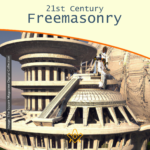 21st Century Freemasonry – a Sign of the Times? A recent article in The Times of London highlighted the dilemma 21st Freemasonry is facing. In this article one Master Mason shares his views of the strengths, and the challenges of modern Masonry. |
 A concept that is both based on our Freemasonic rituals and what we understand as teamwork. This article by Chris Batty examines why teamwork in the lodge is the network that binds us. |
 Lebanese Freemasonry has been both witness to and sometimes participants in turbulent events and forces, which shaped and influenced their world. |
 Is a Masonic Tradition Necessary? Dealing with Masonic tradition is a complex subject that requires careful analysis in order to reach a balanced point on the best etymological definition and the set of discourses and practices, which often end up being presented as such, without, however, presenting bases that support them, often serving only as a discourse that restricts and controls the masses. Fernando Rodrigues de Souza debates this complex subject. |
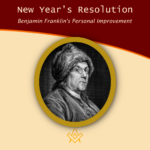 New Year's Resolution with Benjamin Franklin's Personal Improvement Are you ready for a new year's resolution challenge ? To accomplish his life’s goals, at 25 ( around 290 years ago ), Benjamin Franklin developed and committed himself to a personal improvement program that consisted of 13 virtues. You are invited to join me in practicing his daily routine for 2023. |
 The Alberta Masonic Higher Education Bursary Fund is to help the next generation of Albertans, our children and grandchildren, to obtain the education they need to lead successful lives and contribute to the welfare of mankind. As you can see from this little lesson of our history, education is truly a Masonic obligation. |
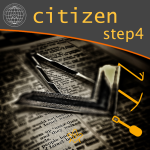 To be a Better Citizen of the World: Step 4 A value proposition for Pure Ancient Masonry as defined in terms of Citizenship; the allegories, symbolism and lessons are a blueprint for all Freemasons to be a better citizen of the world. |
 To be a Better Citizen of the World; Step 3 A value proposition for Pure Ancient Masonry as defined in terms of Citizenship; the allegories, symbolism and lessons are a blueprint for all Freemasons to be a better citizen of the world. |
 In connection with recent article about Freemasonry in the metaverse, we look at how an Egregore applies to Freemasonry in a digital world |
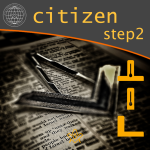 To be a Better Citizen of the World; Step 2 A value proposition for Pure Ancient Masonry as defined in terms of Citizenship; the allegories, symbolism and lessons are a blueprint for all Freemasons to be a better citizen of the world. |
 There are many brotherhoods in the world, and Freemasonry is one of the most significant and successful of them all. This article will be the focus two questions: the importance of brotherhood ? and is there room for improvement in Freemasonry? |
 Intergenerational relations in Masonry: challenges and possibilities Backed with scientific research, Professor Luiz Neto and Professor Alexandre Braune investigate the Intergenerational relations in Freemasonry and explores the challenges and opportunities. |
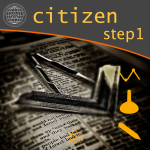 To be a Better Citizen of the World; Step 1 A value proposition for Pure Ancient Masonry as defined in terms of Citizenship; the allegories, symbolism and lessons are a blueprint for all Freemasons to be a better citizen of the world. |
 The Masonic Temple is a platform where both Freemasons and non-Masons, enthusiasts of real art and spiritual growth, connect to the new world of the metaverse. A Freemasonry in the metaverse project, based regular freemasonry principles. |
 Opportunity to fix the Sussex fudge Is there a value proposition for members, that under English Constitution Freemasonry, we have a 4 part offering; Entered Apprentice, Fellowcraft , Master Mason and Companion, conducted in a single craft lodge ? |
 Value Proposition of Freemasonry In addressing declining lodge membership and lack of attendance, we need to assess the value it offers to members. What is value, and what does it mean to you? |
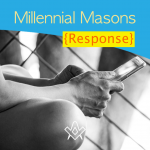 What is a 'Millennial' and what do they want from Freemasonry? You'll be surprised at the answers. |
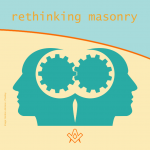 Let us help answer a fundamental question, from a confused newly raised brother asking “What does it all mean and where do I go from here?” |
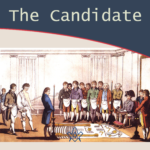 Written in 1930, much of the advice is still relevant today - although some may provoke further thought or debate! |
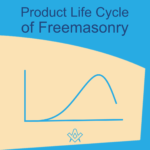 Product Life Cycle of Freemasonry An inconvenient truth about the product life cycle of Freemasonry |
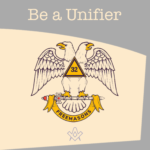 Freemasonry is local. This is where we need to start. We start with our Facebook friends, our neighbours, our colleagues, our lodges… |
 Freemasonry in the time of pandemic The Rule of Six. Localised lockdowns. Second wave? What do we do now?! The answer is simple - engage with members, promote Masonic education and get thinking outside the lodge. |
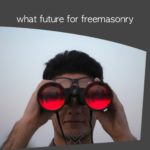 The current functioning of the Masonic movement has some positive aspects and others that are blatantly backward and counterproductive. |
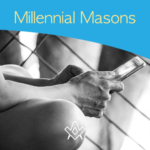 What is a 'Millennial' and what do they want from Freemasonry? You'll be surprised at the answers. |
 How to improve your Lodge Membership Marketing Program. |
 The Anti-Social Impact of Social Media The 'dark side' of social media and its negative effect on our mental health |
 If Freemasonry cannot meet, is this an opportunity to make a change to how we do things? |
 Has your lodge accepted an unknown candidate from the internet? Third in a three-part series looking at the process to accepting candidates via the internet |
 Is the brother of a brother a brother ? Rights to visit - recognition and regularity re-evaluated. |
 The second article in the Unknown Candidate series - Outlining the social media marketing process to attract the unknown candidate to make that first enquiry |
 Ask a random Freemason the purpose of Freemasonry and the likely response will be to “make good men, better”. Research undertaken by James Justin Davis Pennsylvania Academy of Masonic Knowledge. |
 Has your lodge accepted an unknown candidate from the internet? First in a three-part series looking at the process to accepting candidates via the internet |
 Mental Health - Raising its awareness and how we as Freemasons throughout the entire UK can help our fellow brethren and their families when they need it. |
 Share one thought why freemasonry is relevant today - Open question posted on Facebook with a very wide range of responses from Brethren across the globe |
 The Tipping Point of Freemasonry Why do brothers lose interest in Freemasonry and what can we do to get that spark back? At what moment did our own thoughts begin to waver? |
masonic knowledge
to be a better citizen of the world
share the square with two brothers

click image to open email app on mobile device






